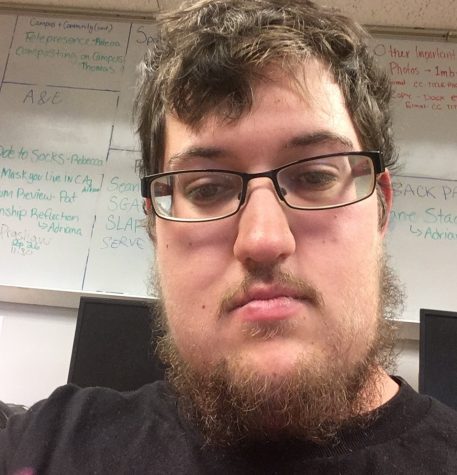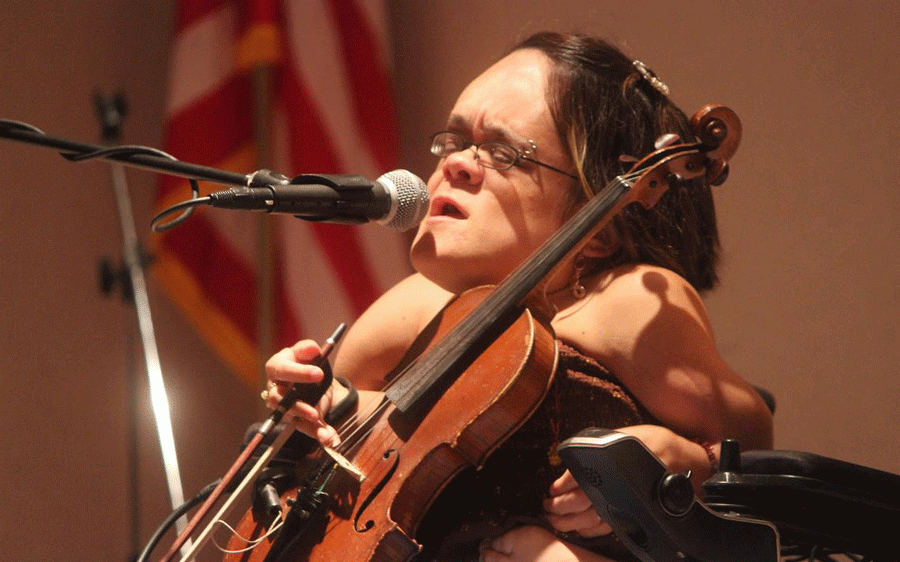Violinist Gaelynn Lea in Stearns: music and “Disability Pride”
Lea, the 2016 winner of NPR’s Tiny Desk Contest, spoke and performed in the Stearns Performance Space on Oct. 24
Musician and disability advocate Gaelynn Lea came to campus on Monday, Oct. 24 to speak about her life with Osteogenesis Imperfecta, also known as “Brittle Bones Disease,” and the importance of recognizing that people with disabilities face challenges in obtaining and keeping a job due to discrimination by employers.
Lea also emphasized that there is a lack of people with disabilities being represented in popular culture, but how it is important for people to have what she calls “disability pride.”
The talk was a Creative Audience event sponsored by the Office of First-Year Experience.
Lea noted that people with disabilities are no less valid than people without disabilities. They should celebrate the fact that they have a disability, because it makes them unique. People should not be defined by their disability. They still have a lot to offer the world and should be treated with respect.
Lea split her talk into three sections: A, B, and C. A for raising awareness, B for eliminating barriers, and C for changing culture.
Lea was born and raised in Duluth, Minnesota. At the age of 21, she had a respiratory attack. Osteogenesis Imperfecta is a disease in which an individual has more fragile bones. According to Lea, she broke 30-40 bones in utero, and then they healed in the womb. The first doctor refused to treat her because of her disability. Then she saw a second doctor, who prescribed Prednisone, which saved her life.
She became interested in the orchestra in 5th grade during a performance at her school.
This performance stoked her love for the violin, and her parents were supportive. Her mother told her, “If I really wanted to do something, I would find a way to do it,” Lea said. She set out to accomplish her goal of playing the violin despite the barrier of a traditional violin’s size. Because of the way her bones healed, her arms are short, which makes holding a violin difficult.
Lea figured out that the size of the violin was not the issue, but how the violin is traditionally held. Lea discovered that if she held the violin upright like an upright bass, she would be able to play it. Armed with this new knowledge, a friend gave her a looping pedal, which she operates with her foot. The pedal allows Lea to play phrases on the violin and then have those phrases repeat, which gives her the ability to add on to the previous phrase, accumulating melodies that are complemented by her voice.
Lea performs both her original songs and traditional fiddle songs.
The three barriers that people with disabilities face concern employment, health care, and accessibility. Lea recounted going to four job interviews for a position at her local Boys & Girls Club, only to be told that she was not suitable for the job because she would, “be scaring the kids.”
She ended up getting the job once her boss told the person who was interviewing her that that was an inappropriate statement to make. “Discrimination can happen behind closed doors,” Lea said. She spoke about being told that she and her husband would have to be divorced in order for her to qualify for her health insurance policy, only to be told that the person on the other end of the line did not read the fine print, so she had not lost her insurance after all.
Accessibility of buildings is another problem that people with disabilities face. The Americans with Disabilities Act was passed 29 years ago, yet so many people are unable to access buildings, which disrupts their lives and is discriminatory.
In particular, Lea is limited in the venues she can perform at because of the structure of the venue. Lea uses a power chair and has found that many venues are not wheelchair accessible.
Lea ended her talk by talking about what she calls “disability pride,” noting that people with disabilities are not represented in popular culture as being desirable. However, Lea believes that people with disabilities should embrace their disability because it does not mean that there is anything wrong with them. It means they are unique and they have gifts to share with the world.
A point that Lea frequently came back to was the fact that it does not matter that a person with a disability adheres to popular culture’s warped and unrealistic beauty standards, she herself refused to let the world influence how she felt about herself.
She wears what she wants and does not pay attention to the opinions of others. Therefore, people with disabilities should not either, it is unnecessary.
Before the talk concluded, Lea played a song she wrote called “Someday We’ll Linger in The Sun, which was one of the songs she performed during her NPR Tiny Desk performance in 2016.
The event was engaging and inspiring. Lea held the audience’s attention throughout her talk, which was by any measure inspiring.
As dinner in the dining hall was soon coming to a close, Lea then took the stage with her violin and played to a full house.
Her style of music mainly originates from the styles of folk and Celtic music, as well as songs from other parts of Europe such as Finland.
From the beginning of the performance, Lea demonstrated her musical talent in a way that the audience was able to feel every bit of emotion from every note. She performed songs such as “Metsakukkia,” a traditional Finnish song and “Grace and a Tender Hand,” the first song she ever wrote.
One particular crowd favorite was “Bird Song” in which the crowd was instructed to sing a set of lines all throughout the song as Lea sang the rest of the lyrics simultaneously.
During her performance, she gave the crowd insight and stories from her travels to various parts of Europe, one such country being Ireland, where she described her experience while singing “Bird Song.” “I tried ending that song, and they didn’t stop singing,” said Lea as she recalled crowd response.
Along with stories from performing internationally, Lea also spoke passionately again about her persistent goal for disability rights and advocating for the fair and ethical treatment of disabled people.
She has been very outspoken about her disability and even performed “I Wait,” which she described as her “only angry song.” She explained how the song was written in response to a health care debate involving John McCain regarding disabled people.
“It was such a big deal for everyone I knew within the disability community,” said Lea in response to her frustrations regarding troubles with Medicaid for disabled people.
After attending one of Lea’s shows, it is easy to gather a new perspective on the world of music by listening to a genre that may be considered underappreciated, as Lea proceeds to give life to every song she performs.
On top of being a fantastic musician, she is also a source of hope and inspiration for not just those who have a disability, but to anyone looking to become successful.
She has accomplished remarkable achievements and continues to travel the world spreading her message to various countries.
Lea will be at numerous locations within the next couple of months including New York City, Washington D.C., Buffalo, Chicago, and other cities.
Her music is available on her website for download, streaming, or purchase of her CDs.

Senior, Interdisciplinary Studies
Grew up in Johnson, VT
Fall 2019 - Present
My favorite food is cheesecake.


